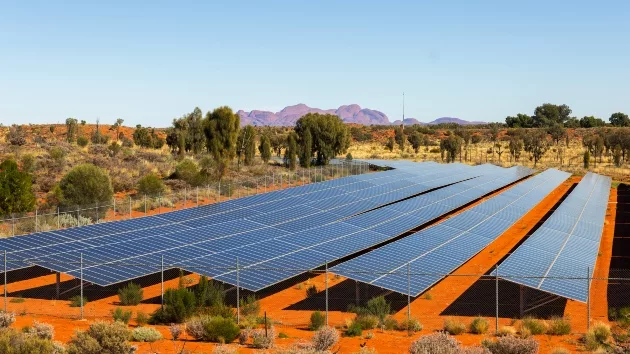(WASHINGTON) — The United States has seen a significant increase in the use of clean energy over the last few years; however, Chris Wright, President-elect Donald Trump’s nominee for secretary of energy, has claimed otherwise.
Wright, chief executive of Liberty Energy — the world’s second-largest fracking services company — has made several comments chastising efforts to fight climate change. One example is a video he posted to LinkedIn last year in which he denies the existence of a climate crisis and disputes a global transition to green energy.
“There is no climate crisis, and we’re not in the midst of an energy transition either,” Wright said.
Wright has been an outspoken critic of policies aimed at curbing climate change, including the Department of Energy’s goal to reach net-zero carbon emissions by 2050.
While Wright does not dispute the existence of climate change, he has argued that policies aimed at reducing the impact of climate change are misguided and alarmist, claiming that any negative impacts of climate change are “clearly overwhelmed by the benefits of increasing energy consumption.”
But the IPCC, the world’s most authoritative body on climate change, has stated that human-amplified climate change is already affecting many weather and climate extremes in every region across the globe, and this has led to widespread adverse impacts and related losses and damages to nature and people.
And the clean energy momentum the country is experiencing will continue as alternative sources of fuel take more market share in the energy sector, experts told ABC News. That’s despite efforts by Republican politicians to bolster the fossil fuel industry in the U.S.
The Department of Energy’s website even states, “A clean energy revolution is taking place across America, underscored by the steady expansion of the U.S. renewable energy sector.”
And the world now invests almost twice as much in clean energy as it does in fossil fuels. Investment in solar panels now surpasses all other generation technologies combined, according to the International Energy Agency.
“The U.S. is definitely in an energy transition, as is the rest of the globe,” Lori Bird, U.S. energy program director at the World Resource Institute, told ABC News.
Coal is one of the industries in which the energy transition is most apparent, Bird said.
Coal plants are seeing an average of 10,000 megawatts of capacity closures per year, according to the Institute for the Energy Economics and Financial Analysis. Installed U.S. coal-fired generation capacity peaked in 2011 at 317,600 megawatts and has experienced a consistent downward trend ever since, the analysis found. In 2020, during the pandemic, coal’s share of power generation in the U.S. fell below 20% for the first time. In 2024 so far, coal’s share of power generation barely topped 16%.
“Based on current announcements and IEEFA research, we expect operating coal capacity to continue its steady decline for the remainder of the decade,” the report states.
Accompanying the sharp decrease in coal generation and usage has been the increase in capacity and storage for electricity generation from solar, wind and battery power, Bird said.
A record 31 gigawatts of solar energy capacity was installed in the U.S. in 2023 — roughly a 55% increase from 2022, according to a report by the World Resource Institute that found that clean energy continues to be the dominant form of new electricity generation in the U.S.
“Everywhere you look, in every facet of the economy, there are clean technologies ramping up and being brought to bear,” Julie McNamara, senior analyst at the Union of Concerned Scientists, told ABC News.
In addition, the Inflation Reduction Act stimulated an “unprecedented” slate for the creation of domestic clean energy manufacturing facilities, the report found. Since August 2022, 113 manufacturing facilities or expansions, totaling $421 billion in investments, have been announced, according to American Clean Power.
The Inflation Reduction Act and the Bipartisan Infrastructure Law that came before it includes tax credits for both the home and commercial installation of charging stations for electric vehicles, evidence in the growing market share for EVs, which reached 10% in U.S. automotive sales in the third quarter of 2024, Bird said.
But the federal government isn’t the ultimate decider of the energy transition in the U.S., Bird said. While there could be a slowdown in progress during the next administration, the energy transition will continue to be driven by other stakeholders “who want this to happen,” she said.
“It would be impossible to halt the energy transition at this stage,” Bird said.
States in the U.S. are also continuing to pass ambitious climate and energy policies, a trend experts expect to continue despite who is living in the White House. State actions are considered critical to ensuring a successful clean energy transition, as federal actions alone are insufficient, according to the WRI. There are 29 states that have renewable electricity standards or clean energy standards in place, and a third of U.S. states have have standards to shift to 100% clean electricity, Bird said.
At the beginning of 2023, Minnesota adopted a 100% clean energy standard, while Michigan did the same later that year, joining states like California and New York in passing permitting reforms intended to make it easier to build clean energy and transmission.
“While the federal leadership may slow some of this transition, it’s being driven by states,” Bird said.
Another critical piece of the energy transition is tech companies, which are very large users of energy. committing to using sustainable energy to power their data centers, Bird said. One example is Microsoft paying to restart one of the nuclear reactors at Three Mile Island in Pennsylvania to power the company’s AI data center.
“Those companies that are driving a lot of this want clean energy,” Bird said. “That’s not going to go away. They’re committed.”
Throughout the 2024 election, Republicans stuck to party lines when it comes to rhetoric about the fossil fuel industry, which invests heavily into GOP politicians and candidates, David Konisky, a professor of environmental politics at Indiana University’s O’Neill School of Public and Environmental Affairs, told ABC News in August. The rhetoric often includes misrepresentations on clean energy solutions rather than all-out climate denial, experts told ABC News.
The fossil fuel industry, through its lobbying in government, has attempted to slow any efforts at the energy transition, McNamara said.
“The only reason to say there’s no energy transition underway is to attempt to solidify policies and incentives that that anchor short-term profits for fossil fuel interests,” McNamara said.
Misinformation and disinformation about the climate crisis is “not helpful to the situation,” especially given that people all over the world are already experiencing the impacts of a warming climate in the form of extreme weather events, Bird said, adding that bipartisan support will be crucial going forward.
“We’re hopeful that with the new administration, that additional progress could be made,” Bird said.
ABC News’ Peter Charalambous, Matthew Glasser, Calvin Milliner and Ivan Pereira contributed to this report.
Copyright © 2024, ABC Audio. All rights reserved.

